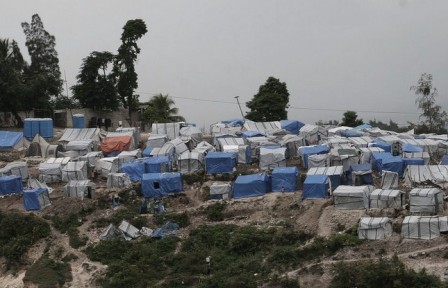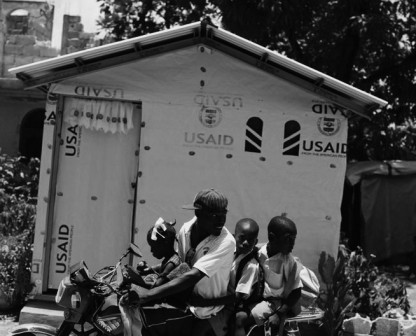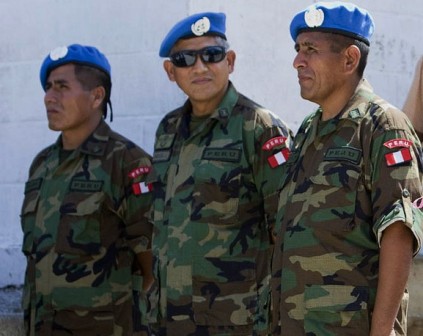Haiti: Deadly Clashes Erupt As UN Forces Are Blamed For Cholera
The clashes between Haitian protesters and UN peacekeepers erupted in Cap-Haitien, the country’s second largest city after its capital Port-au-Prince, and in the central town of Hinche. The rioting crowds blamed the United Nations’ Nepalese contingent for starting the cholera epidemic. According to officials, the death toll of the cholera outbreak has now passed 1,000.
A 20-year-old man was killed near the UN base in Cap-Haitien during the clashes. Police and medical personals in Cap-Haitien also confirmed the death of another young man killed by gunfire. About a dozen people are being treated for bullet wounds, with some in serious condition. Late on Monday, the UN mission in Haiti issued a statement arguing that the protests could be “politically motivated” ahead of the upcoming presidential elections to be held on November 28th.
“The way the events unfolded leads to the belief that these incidents were politically motivated and aimed at creating a climate of insecurity ahead of the elections,” said the UN statement.
Meanwhile, officials fear the cholera epidemic could spread exponentially if it infiltrates the relocation camps around the capital where hundreds of thousands of earthquake survivors are still living with less than sub-standard sanitation. On Monday, a UN official said that there are now cholera cases in everyone of Haiti’s 10 departments, and that everyone should expect a significant increase in the number of infections.
As far as the claims made by Haitian protesters that the cholera epidemic was started by Nepalese peacekeepers, UN officials said that investigations to determine if the protesters are correct will have to wait. However, Haitians suspicions with the origin of the epidemic do have some credible ground, despite the quasi dismissal by the UN.
Cholera had never been documented in Haiti before the outbreak in Mid-October, and the US Center for Disease Control and Prevention found that the cholera strain now ravaging the entire island matched a type specific to South Asia. Further, the suspicions are also reinforced by the fact that the Nepalese base is located on the Artibonite river, where the outbreak started. The Nepalese soldiers arrived there in early October following a cholera outbreak in Nepal, and just about a week before Haiti’s epidemic started.
Beside the cholera backlash of the last two days, many Haitians have a deep and long-standing resentment of the 12,000 strong UN military force, which has been the dominant security force in Haiti since the coup that forced former president Aristide into exile in 2004. Just like Aristide, a growing number of Haitians view the UN peacekeepers as an unwelcome neo-colonial occupation force.
Aristide: Former President In Forced Exile Is Still A Political Factor In Haiti
In a recent interview, former Haitian president Jean-Bertrand Aristide, who is living in forced exile in South Africa, offered his comprehensive analysis and perspective on Haiti’s current desperate situation. Despite living in forced exile, after being ousted from power in 2004, Aristide is still the national leader of the populist party Fanni Lavalas. Aristide served as Haiti’s first democratically elected president in 1990 before he was ousted by a CIA backed coup in 1991. He came back to power in 1994 with the help of the Clinton administration, and still claims that the CIA had a role in the 2004 coup against him.
“As for the recent incident of cholera, whether or not it was imported-as the evidence strongly suggests-it is critical. First, those who organized the coup d’etat/ kidnapping of 2004, paving the way for the invaders now accused as having caused the recent outbreak of cholera, must also share the blame. Second, the root causes, and what facilitated the deadly spread of the disease are structural, embedded in Haiti’s historical impoverishment, marginalization and economic exploitation,” said Aristide.
When asked by reporter/filmmaker Nicolas Rossier what prevented him from going back to Haiti, Aristide said:
“If I try to understand it from the Haitian perspective, I think that I see the picture. The picture is that in Haiti, we have the same people who organized the invasion of 2004 after kidnapping me to put me in Africa. They are still there. That means there is a kind of neo-colonial occupation of 8,900 UN soldiers with 4,400 policemen spending, more or less, $51 million a month in a country where 70 percent of the population lives with less than a dollar a day. In other words, it is a paradise for the occupiers. First we had the colonization of Haiti, and now we have a kind of neo-colonial occupation of Haiti. In my view, they don’t want me back because they still want to occupy Haiti.”
Despite the fact that Aristide is in exile, the events of past two days prove that the words of the former Haitian president still have a strong political impact in the country.
Note: To read the complete and exclusive interview of former president Aristide by Nicolas Rossier click here.
Related Articles
















You must be logged in to post a comment Login